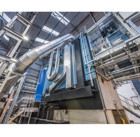Spirotech vacuum degassers help deliver St Andrews’ carbon neutral objectives

Spirotech vacuum degassers are helping Scotland’s oldest university with its ambition to become carbon neutral for energy usage.
The University of St Andrews has established a £25 million biomass district heating centre. It is a key element in the university’s carbon neutral objective and generates hot water in a 10m high 6.5MW boiler. The water is distributed through a network to the campus where it provides low-carbon heat and hot water.
Spirotech’s degassers remove dissolved gasses in the system’s installation fluid by temporarily subjecting a portion of the water to underpressure, or vacuum. The released air is then separated and expelled. By continuously repeating the process, 99.9% of the gases are released and removed. If left to circulate the air would adversely affect the system’s efficiency, impacting on flow rates and causing corrosion. In turn, this could lead to dirt build-up; maintenance problems; higher energy costs; and in the long-term even system breakdown. Spirotech vacuum degassers are designed for use in large commercial systems with many branches and low flow rates, where ‘ordinary’ dearators are not sufficient to achieve the results.








